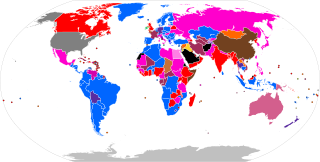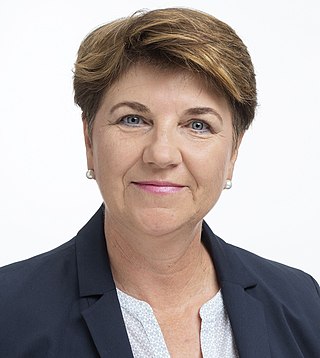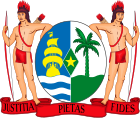
The single transferable vote (STV), sometimes known as proportional ranked choice voting (P-RCV), is a multi-winner electoral system in which each voter casts a single vote in the form of a ranked-choice ballot. Voters have the option to rank candidates, and their vote may be transferred according to alternate preferences if their preferred candidate is eliminated or elected with surplus votes, so that their vote is used to elect someone they prefer over others in the running. STV aims to approach proportional representation based on votes cast in the district where it is used, so that each vote is worth about the same as another. Formally, STV satisfies a fairness criterion known as proportionality for solid coalitions.

The House of Representatives is the lower house of the bicameral parliament of the Netherlands, the States General, the other one being the Senate. It has 150 seats, which are filled through elections using party-list proportional representation. Generally, the house is located in the Binnenhof in The Hague, however, it has temporarily moved to the former building of the Ministry of Foreign Affairs at Bezuidenhoutseweg 67 in The Hague while the Binnenhof is being renovated.

The Federal Council is a cabinet of seven members. Since after World War II, the Federal Council is by convention a permanent grand coalition government composed of representatives of the country's major parties and language regions.

Elections in the Netherlands are held for five territorial levels of government: the European Union, the state, the twelve Provinces, the 21 water boards and the 342 municipalities. Apart from elections, referendums were also held occasionally, but have been removed from the law in 2018. The most recent national election results and an overview of the resulting seat assignments and coalitions since World War II are shown at the bottom of this page.
Regular elections in Croatia are mandated by the Constitution and legislation enacted by Parliament. The presidency, Parliament, county prefects and assemblies, city and town mayors, and city and municipal councils are all elective offices. Since 1990, seven presidential elections have been held. During the same period, ten parliamentary elections were also held. In addition, there were nine nationwide local elections. Croatia has also held three elections to elect members of the European Parliament following its accession to the EU on 1 July 2013.

Elections in Guinea-Bissau take place within the framework of a multi-party democracy and a semi-presidential system. Both the President and the National People's Assembly are directly elected by voters.

Elections in Kenya take place within the framework of a multi-party democracy and a presidential system. The President, Senate and National Assembly are directly elected by voters, with elections organised by the Independent Electoral and Boundaries Commission (IEBC).

Elections in Lithuania are held to select members of the parliament, the president, members of the municipal councils and mayors, as well as delegates to the European Parliament. Lithuanian citizens can also vote in mandatory or consultative referendums.

Following the 2011 Tunisian revolution, elections in Tunisia for the president and the unicameral Assembly of the Representatives of the People are scheduled to be held every five years. The assembly can be dissolved before finishing a full term.

Elections in Zambia take place within the framework of a multi-party democracy and a presidential system. The President and National Assembly are simultaneously elected for five-year terms.
The Edmonton provincial electoral district also known as Edmonton City from 1905 to 1909, was a provincial electoral district in Alberta, Canada mandated to return members to the Legislative Assembly of Alberta from 1905 to 1917 and again from 1921 to 1959.
The 1927 Manitoba general election was held on 28 June 1927 to elect Members of the Legislative Assembly of the Province of Manitoba, Canada. The result was a second consecutive victory for Manitoba farmers, following its 1922 win.

General elections were held in Suriname on 25 May 2005. The governing New Front for Democracy and Development of president Ronald Venetiaan lost seats, remaining the largest party but failing to get a majority in the National Assembly of Suriname. Despite this Venetiaan was re-elected as president after obtaining sufficient support to win a majority in the election for president.

An electoral system or voting system is a set of rules that determine how elections and referendums are conducted and how their results are determined. Electoral systems are used in politics to elect governments, while non-political elections may take place in business, non-profit organisations and informal organisations. These rules govern all aspects of the voting process: when elections occur, who is allowed to vote, who can stand as a candidate, how ballots are marked and cast, how the ballots are counted, how votes translate into the election outcome, limits on campaign spending, and other factors that can affect the result. Political electoral systems are defined by constitutions and electoral laws, are typically conducted by election commissions, and can use multiple types of elections for different offices.

Parliamentary elections were held in Kiribati in 2020 to elect members of the House of Assembly. The elections were originally planned on 7 April 2020, with a second round of voting to be held on 15 April 2020. However, in late March the Electoral Commission changed the voting date to 14 April 2020, with a second round on 21 April 2020.

General elections were held in Namibia on 27 November 2019. Ballots were cast using electronic voting. A total of eleven candidates ran for the presidency and fifteen political parties contested the National Assembly elections.
Legislative elections were held in New Caledonia in January 1945. The first round of voting was held on 7 January and the second round on 24 January.
General elections were held in the Netherlands Antilles on 17 March 1949. This was the first parliamentary election in the Netherlands Antilles after the introduction of universal suffrage. At previous elections ten of the fifteen seats in the Estates of Curaçao were elected, with the remaining five appointed by the governor. This time the elections were about 21 seats in the Estates of the Netherlands Antilles and no seats were appointed by the governor. The 21 elected seats consisted of eight for Curaçao, eight for Aruba, two for Bonaire and one for each of the three SSS Islands.

By-elections to the Swiss Federal Council were held on 5 December 2018, after federal councillors Johann Schneider-Ammann (FDP-BE) and Doris Leuthard (CVP-AG) announced in September they would leave the Council effective 31 December of the same year.

By-elections to the Swiss Federal Council were held on 7 December 2022, after federal councillors Ueli Maurer (SVP-ZH) and Simonetta Sommaruga (SP-BE) announced they would leave the Council effective 31 December of the same year. The parliament elected Albert Rösti and Élisabeth Baume-Schneider respectively to replace them.















